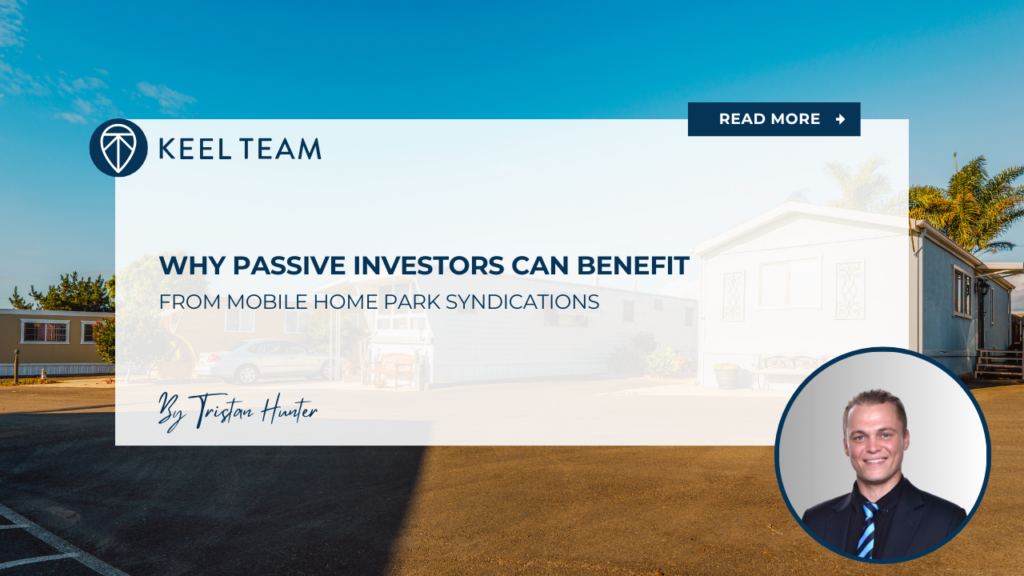Why Passive Investors Can Benefit from Mobile Home Park Syndications
-
 Tristan Hunter - Investor Relations
Tristan Hunter - Investor Relations

Investing passively in real estate has become increasingly popular, especially in niche sectors like mobile home park syndications. For those looking to diversify their portfolios without managing properties themselves, mobile home park syndications often offer attractive opportunities. While results can vary and are never guaranteed, passive investors usually experience several key benefits when participating in these investments.
What are Mobile Home Park Syndications?
A mobile home park syndication allows multiple investors to pool their funds to purchase and operate a mobile home park. Typically, a sponsor manages the acquisition, daily operations, and eventual sale, while passive investors contribute capital. In return, passive investors usually receive a share of the rental income and potential profits from appreciation.
This structure makes it possible to invest in larger, professionally managed mobile home parks without taking on active ownership responsibilities.
Access to a Unique Real Estate Asset
Mobile home parks are a distinct real estate asset class. They often provide affordable housing solutions, which tend to stay in demand across economic cycles. Passive investors who participate in mobile home park syndications usually gain exposure to this sector, which might otherwise be difficult to access individually.
Investing in syndications can also diversify a portfolio. Instead of putting all their capital into stocks or traditional real estate, passive investors can broaden their holdings into affordable housing communities.
Download our FREE eBook on the Top 10 things to know BEFORE investing PASSIVELY in mobile home parks!
Professional Management Expertise
Professional management is a major advantage of mobile home park syndications. Passive investors usually do not have the time or experience to handle day-to-day property operations. By partnering with an experienced sponsor, they can rely on professionals to manage tenant relations, maintenance, rent collections, and regulatory compliance.
This oversight often helps maximize property performance and address operational issues quickly. Although results can vary, professional management generally reduces risk compared to managing a mobile home park alone.
Potential for Attractive Cash Flow
Mobile home parks are often associated with stable cash flow. This is partly because tenant turnover tends to be lower and demand for affordable housing remains strong. In a mobile home park syndication, passive investors typically receive periodic distributions from rental income.
Since tenants often own their homes and pay rent only for the land, operational expenses are usually lower than in other real estate asset classes. These lower costs can strengthen net operating income, which may support higher potential cash flow for passive investors.
However, it’s important to understand that cash flow can fluctuate based on property performance and market conditions.
Opportunity for Long-Term Appreciation
Beyond cash flow, syndications may offer the potential for long-term appreciation. Improvements like raising lot rents, boosting occupancy, and upgrading infrastructure can increase a mobile home park’s overall value.
When the mobile home park is eventually sold, proceeds are distributed to investors after paying debts and expenses. While gains are never guaranteed, passive investors might benefit from value growth over time.
Mobile home park syndications are typically long-term investments. It often takes several years before appreciation fully materializes.
Lower Cost of Ownership Compared to Other Assets
Mobile home parks often have a cost structure that benefits owners. Since tenants usually own their homes, the mobile home park owner is mainly responsible for the land and infrastructure. This setup often leads to lower maintenance and repair expenses compared to other property types.
Tenant turnover also tends to be low because moving a mobile home can be expensive and complicated. Lower turnover often means fewer expenses related to vacancy and marketing.
While every investment is different, these characteristics generally lead to more predictable operating costs.

Potential Tax Advantages of Mobile Home Park Syndications
Real estate investments often come with tax benefits, and mobile home park syndications are no exception. Passive investors might take advantage of deductions for depreciation, mortgage interest, and property expenses, all of which can lower taxable income.
Mobile home parks also allow for accelerated depreciation strategies, such as cost segregation studies, which may enhance tax efficiency early in the investment. However, tax outcomes vary for each investor. It’s important to consult a tax professional to fully understand the impact of a mobile home park investment.
Minimal Time Commitment
Many passive investors value their time as much as their money. Mobile home park syndications usually require very little ongoing involvement after the initial investment. Sponsors manage the acquisition, operations, and eventual sale of the mobile home park.
Passive investors typically receive updates, financial reports, and distributions without needing to handle daily operations. This hands-off structure makes mobile home park syndications appealing for busy professionals or those seeking passive income streams.
Important Considerations
While syndications offer many potential benefits, they also carry risks. Every investment depends on factors like sponsor performance, property management, local market conditions, and economic changes. Passive investors should always perform thorough due diligence on both the sponsor and the specific mobile home park.
Many mobile home park syndications are available only to accredited investors. They often involve holding periods of five years or longer, with limited liquidity during that time.
Understanding these factors is critical before committing to a passive investment.
Conclusion: Are Mobile Home Park Syndications Worth Considering?
Mobile home park syndications usually provide passive investors with a combination of potential cash flow, long-term appreciation, professional management, and portfolio diversification. With lower operational costs and steady demand for affordable housing, mobile home parks continue to attract attention as a real estate investment option.
However, like any investment, outcomes can vary. Passive investors should carefully evaluate opportunities, align them with personal goals, and seek advice from financial and legal professionals before participating in mobile home park syndications.
Are you looking for MORE information? Book a 1-on-1 consultation with Andrew Keel to discuss:
- A mobile home park deal review
- Due diligence questions
- How to raise capital from investors
- Mistakes to avoid, and more!
Disclaimer:
The information provided is for informational purposes only and is not investment advice or a guarantee of any kind. We do not guarantee profitability. Make investment decisions based on your research and consult registered financial and legal professionals. We are not registered financial or legal professionals and do not provide personalized investment recommendations.

Tristan Hunter - Investor Relations
View The Previous or Next Post
Subscribe Below 👇





